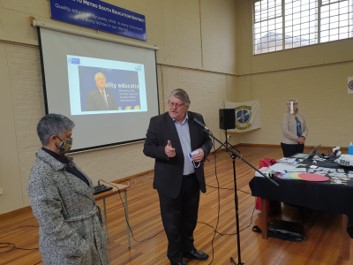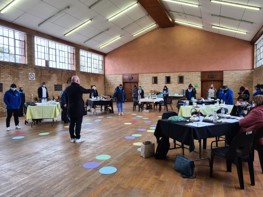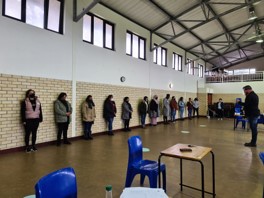South Africa’s education system and a world defined by change requires educators to function at a high standard, and at times beyond their known skills and comfort zones. To effectively do so, a change in mindset is required.
It is with this objective in mind that the Western Cape Education Department (WECD), in partnership with Letsema, launched the Change Mindset programme on 5 September. The launch saw the first of three neuroscience-based training interventions introduced, with the programme’ s first phase rolled out over the next two months across 30 public schools in the Western Cape region.
Change Mindset is a key pillar of the WCED’s Transform to Perform strategy, conceptualised in early 2017. Change Mindset seeks to help educators create and thrive in a culture where they can easily adapt to change. Mindsets are critical in strengthening personal belief and positive attitudes. In this way, Change Mindset seeks to develop educators’ self-leadership and champion arriving at the classroom with inherent innovation and resilience.
The programme in its entirety will be implemented across 720 schools over the next four years, applying its unique neuroscience-based training to each public-school educator in the province. More than 20,000 educators will be trained across the 2000-plus training interventions. As noted by the WCED, Change Mindset is a representation of the department fulfilling the vision of quality education for every child in every classroom in every school in the province to life. Through empowering educators’ mindsets, the learners under their charge will also benefit as a result of the programme.
Essential to the Change Mindset programme is the caliber of facilitators required for the training. The Western Cape Education Department is explicit in terms of the facilitator qualifying criteria, ensuring that their neuroscience capability and higher purpose is aligned to the Change Mindset programme. The selected facilitators have extensive experience in the field of mindset change, specifically in positive psychology, with a focus on leadership development and mental strength coaching.
At the launch, every participant received a Change Mindset training manual that acted as a navigation tool for the day and for future reference. Warda Conrad, Change Mindset Programme Director for the WCED, noted that Change Mindset is different to other training interventions because there is no set curriculum for action, but instead, it is an act of appreciation to each educator to connect mind and heart. The training content was developed by Letsema in partnership with the WCED in collaboration with several neuroscientists and change management experts.
Change Mindset is grounded in neuroscience, particularly the fields of excellence and high potential, which presuppose that perception is projection. It applies neuro-linguistic science as a means for individual educators to reframe their internal mental perception, with the result being an individual who is adaptable and who enjoys an enhanced projection of the outer world.
The programme’s key objectives are to:
- Know how to utilise neuroscience techniques to change educator mental patterns and develop their true potential
- Uncover and replace restrictive habits, mental filters and limiting beliefs so educators can achieve collective, professional, and personal goals
- Know how to establish rapport with each other and develop fulfilling and productive relationships
- Learn how to build and maintain their flexibility, confidence, and emotional state to facilitate effective transformation, technology development and improvement within their educational context
Based on feedback following the programme’s first day, participants enjoyed the insight provided with a sense of anticipation already established for the next training intervention, scheduled for October. Participants expressed an increased level of self-awareness, learned about observed defaulting mental patterns, but more importantly, the ability to change their mode of thinking and acting.
Critically, those participating in each training session will provide feedback on the sessions themselves, underlining the emphasis on quality assurance and continual monitoring and evaluation, so it can be adjusted to aid educators in optimal ways.
Based upon initial participant and stakeholder feedback, the Change Mindset programme will likely play a positive and active role in empowering educators within the Western Cape’s public-school system. Over the four-year timeline, the programme’s evolution will be informative with learnings absorbed, adapted, and applied in new ways to benefit participants and become a global benchmark in educator mindset change and enhancement.













